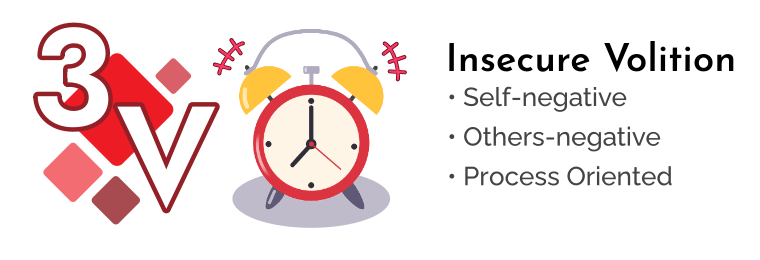
The 3V attitude is characterized by a self-negative (Vs-) and others-negative (Vo-) disposition. This disposition creates an attitude that is plagued by an awareness of limitations, weakness, harm, negative consequences, and manipulation within the realm of volition. This awareness applies internally, externally, and within the exchange of information in the aspect. 3Vs have a keen sense of how they can be harmed by volition. The strategies that each 3V employs to deal with the insecurity may differ in behavior or execution but the core attitude of subjective vulnerability and insecurity will remain consistent for all 3Vs. Below are some common beliefs and behaviors that you may see with 3Vs. Please keep in mind that these are generalities and do not represent the vast sub-archetypes held within the overall 3V attitude.
Dichotomies
Uncertain • Insufficient • Weak • Aggressive • Subjective • Vulnerable • Wordy • Expansive • Universal
Inner Conflict
• Finds thinking about workload and end goals or objectives to be anxiety inducing and may loop-out in constant worry.
• Does not inherently trust themselves to react to power structures efficiently, and must intensely consider options.
• Feels anxious about large or complex objectives and insecure in how their ability to perform is perceived by others.
• Feels doubtful about their potential and how to conjure up motivation to reach an already unknown potential.
• Overestimates how much motivation or consideration any future plan requires.
• Panics or “spins out” when mental energy levels slip lower without warning.
• Becomes worried and unsure of how to overcome actual or perceived obstacles.
• Over-analyzes and replays what it took to accomplish any past goals that lead to the current state of being.
• Highly skeptical of self-help gurus, get-rich-quick schemes, self-promoters, and those who claim to be giving away free power.
Reactive Phase
• Obsesses over processing the possible outcomes of their own decisions.
• Questions authority or anyone that insinuates something should be done a certain way for a particular outcome.
• Pushes themselves to feel more powerful and capable of attaining a future objective, becoming aggressive and resistant towards others.
• Openly complains and worries about their future.
• Acts chaotic and unpredictable, often sabotaging their own projects or manically starting new ones with no focus on feasibility.
Dormant Phase
• Ignores thinking about decisions and how they will affect their future self.
• Abandons discussion about obligations and responsibilities as this evokes unneeded anxiety.
• Shuts off their typical strategies to mentally energize themselves.
• Gives up on projects – throws away plans.
• Tends to ignore obstacles as if they do not exist.
• Stonewalls anyone who offers advice.
• Leaves all conversations where the future is brought up.
Secure Phase
• Feels a comfort in success and how their completed goals define them.
• Feels a sense of calm in exploring their own capabilities and potential.
• Understands their own limitations of power and can accept that.
• Empathizes with those who demand or expect them to focus on a goal.
• Perceives accomplishments for what they are rather than what they could mean about their identity or character.
• Uses pressure as a form of energy rather than source of anxiety.
• Becomes accepting of outside authority through realizing their own power and authority.